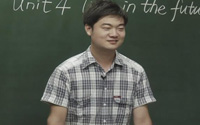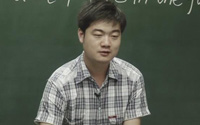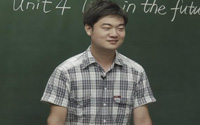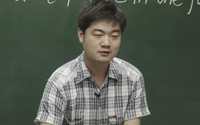课程内容
《The Olympic Games》
Learning goals:
1.to review the language and structures in this unit
2.to do some practice as consolidation
Introduction
为了更好的复习本单元的内容,本节课将从“课文回顾”和“语法练习”两个方面展开,从而达到巩固提高的效果。
About the story of reading:
There is a dialogue between Li Yan and Pausanias,who was a Greek write about 2,000 years ago.Our goal is to understand their dialogue and summarize the differences between the ancient and modern Olympic Games.
Differences between the ancient and modern Olympic Game:
Ancient Olympic Games
1.only free citizens of one country could take part
2.slaves and women could not take part
3.Always in the same place
4.Only once every four year
Modern Olympic Game
1.competitors from many countries
2.all adults can take part if they reach the required standard for their event
3.Hosted by different countries
4.Summer and Winter Games:Special and Paralympics
Paraphrase some sentences:
Only athletes who have reached the agreed standard for their event will be admitted as competitors.
只有达到他们各自项目统一标准的运动员才会被接受奥运会。
reach:达到,实现
a conclusion/decision/agreement
Oil prices have risen by 32 percent since the start of the year,reaching a record of $57 a barrel
stand for 代表,象征
The American flag stands for freedom and justice.
[观察】阅读下列句子,观察admit在句中的用法。
1.I must admit to being ashamed for what hads happened.
vt.承认,后加(to) doing sth.名词、代词或从句
2.I am sure that he will be admitted to University this summer.
3.You won't be admitted to the theatre after the play has started.
4.The theatre admits 1,000 people.
接收,准许进入,容纳
5.The law admits of no exceptions.
admit of 容许;有...余地,只用“事”或“物”作主语
Our Greek cities used to compete against each other for the honor of winning.我们希腊各个城市之间曾经为了赢得荣誉而彼此争斗。
1.used to do sth. 表示过去经常做某事(to 是不定式符号)
He used to smoke.
be used to doing sth;表示习惯于做某事(to 是介词)
We are used to getting up early.
2.compete with/against 与..竞争
compete for 为...而竞争
competitor n.比赛者
competition n.比赛
competitive adj.
根据括号内所给的提示将下列句子翻译成英语。
1.这学期我们将有一们古代史课程。(ancient)
We will have a course in ancient history this term.
2.二十位姑娘参加了赛跑。(compete)
Twenty girls competed in the race.
3.这是他们首次参加亚洲杯,但是他们首场比赛的表现令人失望。(take part in)
This is the first time that they have taken part in Asia Cup,but what they did in the first match is disappointing.
4.她在上届奥运会女子马拉松(marathon)赛跑中赢得金牌。(medal)
She won the gold medal in the women's marathon at last Olympic Games.
5.字母X代表未知数。(stand for)
The letter"X" stands for and unknown number.
6.当时,破烂妇女是不允许进大学的,因此,玛丽决定去巴黎学习。(admit)
At that time women were not admitted to universities in Poland,so Mary decided to go to Parirs to study.
7.在2012年时,伦敦将成为第一个三次承办现代奥运会的城市。(host)
London will become the first city to host the modern Olympic Games three times in 2012.
8.鲁迅不仅是一位伟大的作家,而且是一位伟大的思想家。(not only...but also..)
Lu Xun is not only a great writer but also a great thinker.
语法:被动语态
被动语态的构成
英语动词的被动语态一般由“be的一定形式+及物动词的过去分词”构成。be 在人称和数上必须同主语一致。
被动语态的时态是由be的时态决定的,be是什么时态,全句就是什么时态,be后面的过去分词不变。
那些可用于被动语态的动词
1.及物动词可用于被动语态,因为及物动词有宾语,把宾语变成主语,句子就变成被动结构:
Someone broke the window.→ The window was broken.
2.不及物动词若与介词结合构成成语动词,此时可接宾语,句子也就有被动结构。
They have broken into house.→ His house has been broken into.
3.非谓语动词,由于不是谓语,不能改成被动语态,但可以有被动形式:to be done ; being done
一般将来时被动语态用法:
1)一般将来时被动语态由“shall (will)+be+及物动词的过去分词”构成。使用时应注意下面句型由主动语态变为被动语态的方法。
(1)主语+谓语+宾语,例如:
主动:We'll build a new house next year.
(2)主语+谓语+间接宾语+直接宾语(习惯上把间接宾语变为被动语态的主语)
主动:My mother will give me a shirt.
被动:I will be given a shirt(by my mother).
如果把直接宾语改成主语时,则在间接宾语前加to 或for
主动:My mother will give me a shirt.
被动:A new shirt will be given to me(by my mother).
(3)主语+谓语+宾语+宾补。如果是含有符合宾语的主动句变成被动句时,将其中的宾语变为主语,宾补不变。例如:
主动:We'll ask him to help you tomorrow.
被动:He will be asked to help you (by us).
表示将来时的结构:will/shall+do
be+going +to do be+doing
be +to do be +about+to do
do → be done
1.We'll build a new house next year
A new house will be built (by us)next year.
2.My mother will give me a present.
I will be given a present (by my mother).
A present will be given to me (by my mother).
3.The mother is going to tell the baby a story
The baby is going to be told a story (by the mother).
A story is going to be told to the baby(by the mother).
4.Kelly is about to sing us a song at the party.
We are about to be sung a song (by Kelly) at the party.
A song is about to be sung for us (by Kelly)at the party.
5.The police is going to have the thief stay in prison.
The thief is going to be had to stay in prison(by the police).
Summary
通过学习本节课,我们回顾了第二单元的课文大意,复习了其中重点的词汇与结构,并对“将来时态的被动语态”这个语法项目进行了总结和练习,从而加深了对时态和语态关系的认识,希望能达到巩固提高的效果。
Homework
Review the language points and Grammar in this unit.
此内容正在抓紧时间编辑中,请耐心等待
郭老师
女,中教高级职称
市名师、市学科带头人、市骨干教师。有丰富的教学经验和与学生的沟通交流经验。























